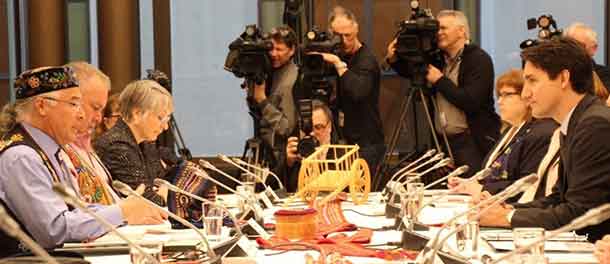
OTTAWA – The leadership of the Métis Nation came together to meet with Prime Minister Justin Trudeauand several of his Cabinet Ministers to sign the groundbreaking Canada-Métis Nation Accord. The Accord marks a turning point for Canada and the Métis Nation who will now commence negotiations on shared priorities in a permanent bilateral forum chaired by the Prime Minister.
The priorities agreed to by the Prime Minister and the leaders of the Métis Nation include employment and training, education, housing and homelessness. The Accord also identifies the need to address Métis health conditions and to address Métis youth and the early learning needs of Métis children. Finally, it identifies a need to strengthen the government to government fiscal relationship.
The Accord was the subject of months of negotiation between the Government of Canada led by Minister Bennett and the Board of Governors of the Métis National Council.
“Today marks a reset in the relationship between Canada and the Métis Nation,” said President Clément Chartier of the Métis National Council. “A process is in place to deal with issues in a concentrated and collaborative manner and that speaks to the commitment of both parties to get things done.”
“I was honoured, on behalf of the Métis Nation of Ontario, to bring forward the concerns and hopes of our citizens directly to Prime Minister Trudeau and key members of the Cabinet,” stated President Froh. “These discussions mark an important step in the relationship between the Crown and the Métis Nation based on recognition, rights and respect and the opportunity to begin to move forward in the spirit of cooperation and partnership to realize a better and brighter future for the Métis Nation and, in doing so, for all Canadians”.
President David Chartrand of the Manitoba Metis Federation also expressed his support for the process entered into today: ” I am optimistic after today’s Summit with Prime Minister Trudeau. As equal partners of Confederation, it is important we renew and strengthen the Métis Nation-Crown relationship upon the principles of cooperation, respect for rights, equality and a commitment to end the status quo. The Métis Citizens of Manitoba, and I as their elected President, will be expecting the Federal Government to address in good faith those things of vital importance to us as a people using the foundation of the Canada-Métis Nation Accord we signed today.”
“The Accord between the Métis Nation and the Government of Canada is an essential first step towards achieving reconciliation” said Métis Nation – Saskatchewan Vice-President Gerald Morin. “This Accord, and the Permanent Bilateral Mechanism it creates, will be a foundational process to facilitate the resolution of outstanding grievances of the Métis Nation.”
President Audrey Poitras of the Métis Nation of Alberta stated: “This accord demonstrates the commitment of Prime Minister Trudeau to working with the Métis Nation on a government to government basis. I look forward to the work we have ahead of us and expect it will result in positive outcomes for the Métis people in Alberta.”
President Clara Morin Dal Col of Métis Nation British Columbia called the signing of the Accord, “a tremendous step forward for the Métis Nation. I was honoured to be able to sign such an important document on behalf of the Métis people in British Columbia.” She added, “The provisions of this Accord will enable us to help make a difference for Métis people in British Columbia and elsewhere in the Métis Nation.”
President Melanie Omeniho of the Women of the Métis Nation stated, “It is a very exciting time to see the government of the Métis Nation put forward the priorities of the Métis People in our Crown-Métis Nation relationship.”
The MNC represents the Métis Nation in Canada at the national and international levels. The Métis Nation’s homeland includes the 3 Prairie Provinces and extends into the contiguous parts of British Columbia, Ontario, the Northwest Territories and the United States. There are approximately 400,000 Métis Nation citizens in Canada, roughly a quarter of all Aboriginal peoples in the country.

